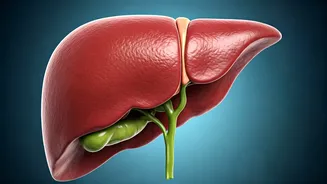Limit Alcohol Intake
Consuming alcohol excessively is a primary cause of liver damage, leading to conditions like fatty liver disease, alcoholic hepatitis, and cirrhosis. The
liver works hard to metabolize alcohol, and when it's overloaded, it can't function effectively, causing harm to liver cells. To protect your liver, it's crucial to moderate your alcohol consumption or abstain altogether. The recommended limits vary, but generally, less is always better. Consider tracking your intake and setting clear boundaries to avoid exceeding safe levels. Choosing non-alcoholic alternatives can also offer a healthier lifestyle choice. Paying close attention to how your body responds to alcohol and being mindful of your drinking patterns contributes to a healthier liver.
Eat Healthy Diet
A diet high in processed foods, saturated fats, and sugar can contribute to liver damage. Such foods can lead to weight gain, insulin resistance, and the accumulation of fat in the liver, known as non-alcoholic fatty liver disease (NAFLD). Prioritizing a balanced diet is essential for maintaining a healthy liver. Focus on including plenty of fruits, vegetables, whole grains, and lean proteins in your meals. These foods provide vital nutrients and antioxidants that protect liver cells from damage. Limiting processed foods, sugary drinks, and unhealthy fats can further aid in keeping your liver healthy and functioning well. A balanced diet not only supports liver health but also contributes to overall wellness and reduces the risk of chronic diseases.
Exercise Regularly
Regular physical activity is vital for maintaining a healthy liver. Exercise helps to reduce body fat, which in turn reduces the build-up of fat in the liver. It also improves insulin sensitivity and reduces inflammation, factors that can contribute to liver damage. Aim for at least 30 minutes of moderate-intensity exercise most days of the week, such as brisk walking, jogging, cycling, or swimming. Incorporating both aerobic and resistance exercises into your routine can provide additional benefits. Consistent exercise not only benefits the liver but also enhances overall cardiovascular health, boosts mood, and helps manage weight. Integrating physical activity seamlessly into your daily life can contribute to the long-term well-being of the liver and overall health.
Maintain Healthy Weight
Being overweight or obese increases the risk of NAFLD, a condition where excess fat builds up in the liver. Maintaining a healthy weight through a combination of diet and exercise is crucial for preventing and managing liver problems. Achieving a healthy weight can reduce fat accumulation in the liver, decreasing inflammation and improving liver function. Focus on a balanced diet rich in whole foods and incorporate regular physical activity to help manage your weight effectively. Consider consulting with a healthcare professional or a registered dietitian for personalized guidance on weight management strategies. Even modest weight loss can significantly improve liver health and reduce the risk of related health issues, contributing to a longer, healthier life.
Use Medications Wisely
Many medications can cause liver damage, especially when taken in high doses or for extended periods. It's essential to be cautious when taking any medication and to adhere strictly to the prescribed dosage and duration. Always consult with your doctor before taking any new medications, including over-the-counter drugs and supplements, especially if you have existing liver conditions. Read and understand the warnings and side effects information. Avoid combining multiple medications without consulting your doctor, as this could increase the risk of liver damage. Be proactive about your health, and ask your healthcare provider about potential risks and precautions related to your medications to protect your liver from harm and to ensure optimal liver function.
Practice Safe Hygiene
Hepatitis viruses are a common cause of liver damage. Hepatitis A and E are often transmitted through contaminated food or water, while hepatitis B and C are often spread through contact with infected blood or bodily fluids. Practice safe hygiene to protect yourself from these infections. Wash your hands thoroughly with soap and water after using the restroom, before preparing food, and after being in public places. Avoid sharing personal items like toothbrushes and razors, as these can transmit bloodborne viruses. Get vaccinated against hepatitis A and B if you haven't already. When getting tattoos or piercings, choose reputable establishments that use sterile equipment. Practicing these preventive measures can significantly reduce your risk of contracting hepatitis and protect your liver from potential damage.
Get Regular Checkups
Regular medical checkups are essential for detecting potential liver problems early. Early detection allows for timely intervention and can prevent serious complications. If you have any risk factors for liver disease, such as a family history of liver problems, alcohol abuse, or diabetes, it’s particularly important to schedule regular checkups. During your checkup, your doctor may order blood tests to assess your liver function. These tests can help identify any abnormalities and enable your doctor to diagnose and address any issues promptly. Openly discuss any concerns or symptoms with your healthcare provider to help them monitor your liver health. Regular checkups, combined with a proactive approach to your health, can help protect your liver and ensure it functions optimally, contributing to your overall well-being.
















